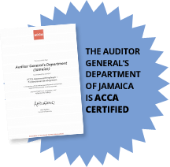
The responsibilities and authority of the Auditor General are detailed in the Constitution and the Financial Administration and Audit Act. The Auditor General and the employees of the Auditor General’s Department are tasked with conducting independent audits in accordance with acceptable, professional and ethical standards and issue appropriate reports on the use of public resources.
Our audit universe
The Departments conducts assurance and performance audits of all government ministries, departments, local authorities and agencies to include all statutory bodies
Statutory submission deadlines
The Public Bodies Management and Accountability Act, the Financial Administration and Audit Act and, The Executive Agencies Act require the submission of annual financial statements and the submission of appropriation account to the Auditor General’s Department three months following the end of the financial year.
Audit Services
The Department currently carries out five types of audits:
- Financial Statement: Financial Statement audits are conducted in accordance with International Standards, to enable the Auditor General to express an opinion providing reasonable assurance on whether the financial statements are prepared, in all material respects, in accordance with an applicable financial reporting framework and to communicate her findings to those charge with governance in accordance with International Standards.
- Compliance Audits: Compliance audits are conducted in accordance with the International Organization of Supreme Audit Institutions (INTOSAI) standards to enable the Auditor General to arrive at a conclusion as to whether the activities of public sector entities are in accordance with the relevant laws, regulations and authorities that govern such entities. Such audits involve an assessment of the degree to which the audited entity is accountable for its actions and exercises good public governance. Specifically, this may involve auditing the extent to which the audited entity follows rules, laws and regulation, budgetary resolutions, policy, established codes, or agreed terms, such as the terms of contract or the terms of a funding agreement.
- Performance Audits: Conducted to primarily identify improvements needed. These audits evaluate whether:
a. The agency’s resources (funds, assets, and personnel) are adequately controlled and used effectively, efficiently and economically
b. The programmes and activities of the entity are conducted and expenditures made in an effective, efficient and economical manner and in compliance with the requirements of applicable laws and regulations and in relation to the achievement of the objectives of the entity. - Information Systems Audits: Conducted to ensure that the entity’s systems have adequate controls in place and are operating effectively and efficiently to achieve each entity’s objectives. The objectives of these audits are primarily to:
a. Assess the relevant general and application controls of each system
b. Determine whether there is compliance with relevant laws, regulations, and guidelines
c. Determine whether the objectives of each system are being met in an efficient and effective manner
d. Assess whether each system adequately supports the respective business objectives of the entities - Special Investigation: These audits are conducted based on information received from stakeholders and concerned citizens. They are also initiated where fraud and misuse of public funds is suspected during the course of conducting a financial audit. The reports from these audits are separate from the financial audit reports.
What comprises an audit and what an audit isn’t?
An audit is an evidence gathering process used to evaluate how public resources are being used, government policies implemented and compliance with key legislation.
An auditor does not,
- Prepare or make changes to source documents
- Assume custody of client assets, including maintenance of bank accounts
- Assume the role of and duties of management
- Determine estimates included in financial statements
An auditor,
- Evaluates and obtains an understanding of the internal control system
- Tests documentation supporting accounting balances or classes of transactions.
- Obtain the audit evidence
- Evaluate the evidence
- Form an opinion and report results




 LinkedIn
LinkedIn Twitter
Twitter Youtube
Youtube
